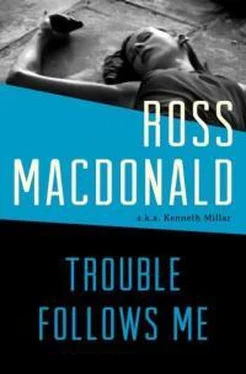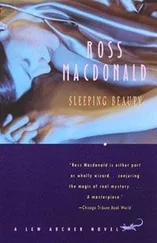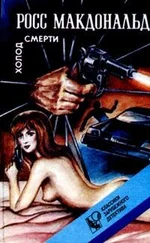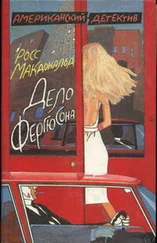“On the second day the first mate went into town, and took along me and five other fellows who knew how to shoot. We were supposed to be a sort of bodyguard. I’ll never forget that walk along the wall to the city. I’ve seen things in Europe since, but nothing like that. On both sides of the wall for it must have been a couple of miles, there were piles of corpses, stiff and starved-looking and sort of thrown together and tangled in heaps. It’s the only time I ever saw human beings treated worse than cordwood.”
Mary was pale and her eyes were large and bright. Hatcher noticed this and said: “Excuse me. I shouldn’t be shooting off my mouth like this. Anyway, you can see why I’m sort of looking forward to getting into the Pacific half of the war. I never felt just the same way about the Germans, but I reckon that’s because I never saw a Nazi concentration camp.”
“Did you manage to get food for your passengers?”
“Yeah, we got in touch with a black market operator. He was a white man, too, can you beat that? But he had an in with the Nips all right. I guess he’d cornered just about all the rice in the city, and he was asking monopoly prices. The first mate finally got about fifty bags, but it didn’t do much good.”
“Why not?”
“When we were one day up the river the Nips bombed the ship. Nearly everybody got off her, but she burned right down to the water. We had a hell of a time getting back to Shanghai. After that I got out of China.” He smiled slightly. “I thought I was getting out of China for good, but I bet I’m there a year from now. I’d like to meet the little yellow-belly that dropped that bomb.” Anderson moved past us down the aisle. I offered him a drink, and he joined us. I told Mary that I’d go to the club car and try to get some setups, but Anderson said:
“I don’t think he’ll sell you any. Kansas is a dry state.”
“I’ve had enough to drink anyway,” Mary said.
I hadn’t. We continued to work on my diminishing bottle. Anderson had a short one and went back to Miss Green. The porter started to make up our berths, and Mary went to sit with the Tessingers while Hatcher and I moved down to the men’s smoking-room.
He leaned towards me and said in an elaborate alcoholic whisper: “Is that fat guy a friend of yours?”
“No, I just met him on the train today.”
“What’s his name?”
“Anderson. He’s in the oil business.”
“So his name’s Anderson, eh? And he’s in the oil business, eh?”
“Do you know him?”
“I don’t know,” he said slowly. “I reckon maybe I do. If I do, it’s going to be very interesting.”
“What do you mean?”
“Oh,” he said, “he just looks like an interesting kind of guy. I’ve always been interested in the oil business.”
If I had been in another mood his evasion would have made me curious, and I’d have tried to cross-question him. But the pulse of good whiskey was beating in my body like a long lifting swell. I was swathed in the mellow calm of semi-drunkenness. At the distance of the day’s journey and the Olympian height from which I regarded them, even the deaths of Sue Sholto and Bessie Land seemed unimportant. Their ruined bodies were trivial things, broken dolls remembered from somebody’s childhood. The whole dark world outside the train window was unreal to me. The only reality was the bright moving room in which I sat drinking with an interesting companion, and the reflection of my own stupidly complacent face in the dark pane.
Hatcher had taken a crumpled envelope from the breast pocket of his khaki shirt, and was fumbling in his other pockets.
“What are you looking for?” I said. “Name it and you shall have it.”
“I’ve got a letter here I’ve got to get off. I’m damned if I know what happened to my pen.”
I handed him mine. He told two folded sheets from the crumpled envelope and spread them out so that I could see that they were closely covered with handwriting. Holding a magazine on his knee he began to write on the back of the second sheet, moving his lips as he silently spelled out the words to himself. If I had been a lip-reader I’d have known the contents of his postscript, and perhaps been able to save his life.
When he had finished he replaced the amplified letter in the envelope and gave me back my pen. I noticed that the letter was already stamped and addressed, and marked ‘Airmail.’
“I should have got this off before. Girl-friend,” he said. “Do you know if there’s a place I can post a letter on the train, or do I have to get off and post it in a station?”
“There’s a mailbox in the club car. It’s a glass box on the wall between the writing table and the bar.”
“Thanks.” He sealed the envelope and went away. But he reappeared in the doorway in a few minutes carrying a bottle of whiskey. The letter was still in his other hand.
“Your whiskey’s all gone,” he said. “Try some of mine.”
He handed me the bottle and went away again. The label on it, which was unfamiliar to me, announced that it contained Rare Old Bonded Kentucky Bourbon, Aged Five Years, Ninety Proof. I broke the seal and uncorked it with the corkscrew on my penknife. I thought I detected the rough rank odor of fusel oil, but I suppressed my doubts and poured myself some in a paper cup. It wasn’t a smooth drink but it was warming, and at that stage I didn’t care.
Hatcher came back, having posted his letter in the club car, and asked me how I liked his liquor.
“It’s terrible,” I said. “But I’ve drunk worse.”
His first drink made him snort. “It’s terrible all right. With this liquor shortage, I had to take what I could get, but the guy that sold it to me said it was real bonded stuff. God knows I paid enough for it.”
“I wish I’d brought more liquor from Chicago,” I said. “I forgot about these dry states. Say, maybe Anderson has some more. I’ll ask him.”
Anderson was sitting with Miss Green in a darkened compartment at the other end of the car. Close together, with their faces turned to each other, they looked incongruously like lovers. But what they were talking about, from the few words I caught before they noticed me, was the oil business in New Mexico. It occurred to me that perhaps he was trying to persuade her to invest money in one of his enterprises.
I broke in on their oleaginous endearments and told Anderson how liquorless I was. But he said:
“I’m sorry, old boy, but you and your friend will have to drink what you’ve got or go dry.”
“He’s your friend too,” I said.
“What do you mean by that? I never saw him before in my life.”
“Maybe he’s seen you somewhere. He was talking as if he knew you.”
There was a trace of impatience in Anderson’s voice now. “Well, I’m afraid I can’t help you anyway. That Teacher’s was all I had.”
I underwent one of the swift changes of mood which occur in an alcoholic state, and became suddenly ashamed of myself.
“Excuse me,” I said to Anderson, and bowed low to Miss Green. “Excuse me for disturbing you so tactlessly.”
“Hell, that’s all right, old boy,” Anderson said heartily. “It happens to all of us. I’m only sorry I can’t help you out.”
Mary left the Tessingers, who were on the point of going to bed, and joined me in the aisle. Most of the berths were made up now, and the car had shrunk to a high narrow tunnel between green curtains. Some of the unreality of the world outside had seeped into the train. For a moment I had a sense of terror, as if the dim aisle were an ancient path in an unknown jungle where dangerous creatures waited in ambush.
“We’re coming into Topeka,” Mary said. “Let’s go out on the platform and have a look.”
Читать дальше







